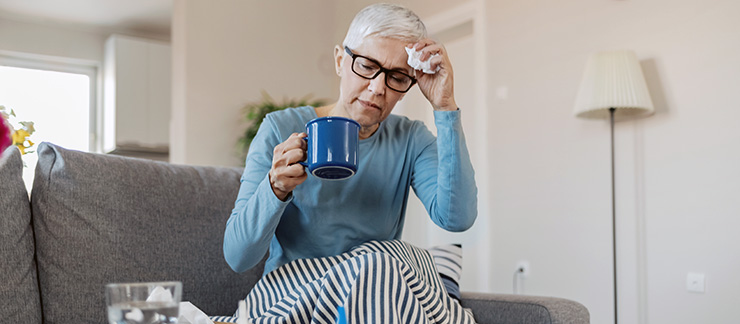
Protect Seniors from the Flu this Winter
Millions of Americans become ill during the dreaded flu season, and hundreds of thousands are hospitalized, according to the U.S. Centers for Disease Control and Prevention (CDC). The vast majority of flu-related hospitalizations occur among vulnerable groups, especially older adults age 65+.
The flu season generally starts in October and lasts until February or March. This winter, protection and risk reduction are especially important as COVID-19 continues to strain the healthcare system. As the flu season begins, the elderly and their family members should understand the risks and necessary steps to avoid the illness.
What Are Flu Symptoms in Seniors?
Symptoms can range from mild to severe and may appear very suddenly. According to Heathline, symptoms can vary and include:
- Fever or feeling feverish
- Chills
- Sore throat
- Cough
- Runny or stuffy nose
- Headaches
- Muscle or body aches
- Fatigue
- Vomiting and diarrhea
The following symptoms can indicate your elderly loved one needs additional medical care and should see a doctor immediately:
- Difficulty breathing
- Sudden dizziness
- Severe vomiting
- Pain or pressure in the chest or abdomen
- Confusion
- Inability to wake up
- Inability to urinate
- Symptoms that improve and then return with fever or worse cough
- Worsening of chronic medical conditions
How to Stay Healthy During the Flu Season
Thankfully, there are several ways seniors and primary family caregivers can protect themselves:
- Get vaccinated
A flu vaccine at the start of the season provides the most protection. Flu vaccines are safe and effective at reducing the risk of serious illness and are available at most pharmacies, doctor offices, walk-in clinics, and hospitals.
During the COVID-19 pandemic, the flu vaccine can be even more necessary. It is possible to be sick with both COVID-19 and the flu simultaneously. In fact, becoming sick with the flu can make you more vulnerable to COVID-19 infection.
If your elderly loved one is unsure about getting the flu vaccine, consult with a doctor. You can also schedule an appointment to receive the vaccine at the same time as your senior if they need reassurance.
- Avoid contact with people who are ill
Seniors should avoid contact with sick people and stay home if they’re feeling under the weather. In healthy adults, the contagious period for the flu may begin up to one day before symptoms appear and can last as long as seven days. People with weaker immune systems can remain contagious even longer.
The same precautions that protect against the spread of COVID-19 also protect against the flu. Encourage loved ones to avoid large gatherings during flu season. Also, be sure to follow local guidelines for social distancing and masking to protect against COVID-19 and the flu.
- Practice personal hygiene
Personal hygiene is a great way to avoid spreading or catching the illness. To help your elderly loved ones stay safe, encourage the following healthy hygiene habits:
- Wash hands with soap and water frequently. If soap and water are not available, an alcohol-based hand sanitizer can be a good substitute.
- Avoid touching your eyes, mouth, and face to prevent exposure to viruses and bacteria.
- Cover your coughs and sneezes. Use a tissue to cover your nose and mouth when coughing or sneezing, and then dispose of the tissue in the trash.
- Clean and disinfect home surfaces such as doorknobs, countertops, and faucet handles.
- Seek medical care if ill
If a senior loved one becomes sick with the flu, make an appointment with a physician even if symptoms are mild. If your loved one experiences severe or life-threatening symptoms, dial 9-1-1 or go to the nearest hospital emergency department.
The flu can be serious for the elderly, but the right precautions and safe senior care habits can minimize risks. If you need additional at-home support for a loved one this flu season, consider reaching out to your local Visiting Angels home care agency.
